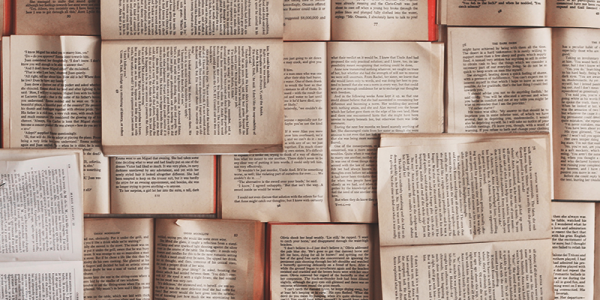As part of the Center for the Literary Arts Speaker Series, award-winning author Anna Moschovakis will participate in a panel discussion and reading April 13 and 14.
Becoming a professional writer is a dream job for many students. But how do creative people translate their love of words into a career?
There’s no single answer, but award-winning author Anna Moschovakis and her agent Akin Akinwumi will offer Arts & Sciences students a glimpse at the inner workings of the literary industry when they visit campus next week.
Moschovakis is a founding member of the acclaimed Ugly Duckling Presse. Her translation of David Diop’s “At Night All Blood Is Black” received the 2021 International Booker Prize. Akinwumi is the founder of Willenfield Literary Agency, an international agency dedicated to representing writers working in contemporary literature.
As part of the Center for the Literary Arts Speaker Series, Moschovakis will take part in the panel discussion on April 13 and a reading on April 14. After the reading, Akinwumi will discuss his work as an agent.
Ahead of her arrival on campus, The Ampersand talked with Moschovakis about her career, inspiration, and upcoming events.

What originally drew you to poetry? Was there a formative poet or work that opened up the artform to you?
My middle school French teacher, improbably, had us reading Rimbaud, Ponge, and Mallarme, so sometimes I credit her (thank you, Mrs. Sawaya). In addition to French, I was serious about theater and drama theory, and I think my exposure to figures like Artaud, Beckett, and Brecht in high school and college laid a foundation for the nexus of poetics-politics-psychology that later drove me to turn to poetry as a primary form. I majored in philosophy in college, and I started to write poetry regularly as a kind of escape valve for the thinking I couldn’t fit into my philosophy papers.
I spent a few years continuing to work in restaurants after college and before applying to an MFA program. When I did, I only applied to Bard College’s interdisciplinary MFA. I couldn’t decide between photography or writing until the very last moment. I landed on writing and read everything the incredible faculty there gave me.
Looking back on your career so far, how did you go about developing your voice and style? Which rules did you learn to bend (or even break) as you progressed as a poet and author?
In life, I constantly have to fight my socialization to behave well, to follow the rules, and to not upset anyone. I think I avoided studying English to preserve a sense of freedom as a writer. I avoided doing an MFA that was academic, or one where you had to specialize as a poet or prose writer, to keep expectations about myself a bit blurry.
When I started writing poetry, I was thinking about philosophy and music. When I started writing fiction, I was thinking about poetry — but also theater and acting. I always feel like a fraud, but somehow that doesn’t keep me from writing. It has been more about mixing things up, being mixed up, and knowing that I can’t sound like everyone else because I don’t “know enough” to do so. This is, of course, a fiction – nobody ever knows “enough”!
Once, early on, a very properly educated person who had just heard me read said, “That was good, but it wasn’t poetry.” I knew what this person meant and maybe even agreed, and somehow it freed me. Maybe I recognized that there wasn’t going to be any way for me to write as someone other than me.
Who are some emerging young poets that readers should have on their radars?
So many! I have recently been spending time with Mirene Arsanios’s book “Autobiography of a Language,” Saretta Morgan’s re-issued chapbook “Feeling Upon Arrival,” and Jennif(f)er Tamayo’s “Bruise Bruise Break.” I wish I could list 100 other books.
For your Washington University visit, you’ll read from your work and participate in a discussion on life as a writer. For any aspiring authors in the audience, what is one piece of advice that you’d like to impart?
There are as many ways to be an artist as there are artists. Don’t be surprised to discover that the state does not want you to survive as an artist. Find your people and never assume you’ve found them all or that you already know who they are and where they live. Practice spontaneity, patience, and love. Get some sleep!





